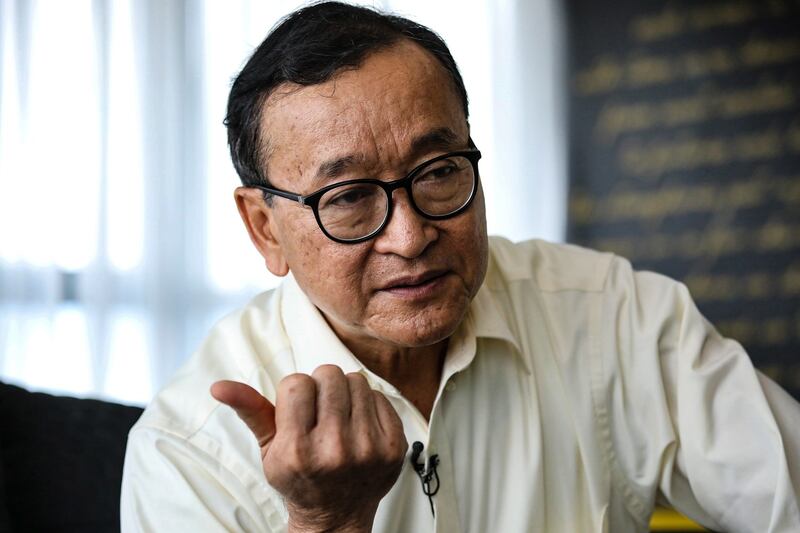UPDATED at 10:53 p.m. EDT on 2022-07-05
A proposed amendment to Cambodia’s Constitution is a thinly veiled attempt by Prime Minister Hun Sen to keep power within his family and does not reflect the will of the people, citizens of the Southeast Asian country told RFA.
Critics say the plan to change two articles that determine how prime ministers are chosen is designed to allow Hun Sen to transfer power to his son Hun Manet by eliminating the need for the National Assembly, or legislature, to approve the pick. The two articles, 119 and 125, are among eight that would be changed by the amendment, which would be the country's 10th.
“If Hun Sen were not able to stay in power, or he got sick, he might hurriedly [transfer power to his son],” Chan Pov Raksmey, a citizen from the northwestern province of Siem Reap, told RFA’s Khmer Service.
“He is afraid of power among the people because so far, what he has done is for himself and his children, not for the national interest,” he said.
Changes to Article 119 would dilute the power of the National Assembly and allow the ruling Cambodian People’s Party (CPP) to sign off on transferring power from father to son, Ly Chandavuth, an environmental activist, told RFA.
“They will want to install Hun Manet to be the prime minister, and won’t give any consideration toward the opposition party,” he said.
As currently written, Article 119 requires a parliamentary vote before a new leader can be approved.
In 2017, Cambodia’s Supreme Court dissolved the country’s main opposition Cambodia National Rescue Party (CNRP), allowing the CPP to win all seats in the National Assembly in a general election the following year.
If Hun Sen were to step down and appoint his son, the selection would almost certainly be approved by the rubber stamp parliament.
But a new opposition party enjoyed some success in Cambodia’s June 5 commune council elections and could capture a significant portion of National Assembly seats in next year’s general election. Should that happen, members of the new Candlelight Party could provide resistance to Hun Sen’s succession plans under the current law.

'Ignoring the people'
Hul Sao, a resident of western Cambodia’s Battambang province, told RFA that the proposed amendment “doesn't reflect the people's will.”
“Any law amendment should seek the people's consent,” he said.
“The National Assembly is creating partisan [laws] and ignoring the people and [the concerns of] NGOs."
Even though the CPP will still likely control the National Assembly after next year’s elections, the amendment acts as a safeguard against people in the party who might not support Hun Manet, Phoung Ratha, a law student, told RFA.
"There will be a shakeup within the CPP, so Hun Sen doesn't trust the National Assembly members to approve the power transfer to his son,” Phoung Ratha said.
The amendment would not be the first attempt by Hun Sen to try to change laws to protect his family.
Hun Sen’s political rival Sam Rainsy, who has lived in self-imposed exile in France since 2015, recalled in an interview with RFA on Friday that in 2014 the CPP chief said he would step down if the CNRP submitted legislation that would ensure that he and two of his political allies were pardoned.
The request was made at a time when the CPP held only a slim 65-58 majority over the CNRP, and could not pass such a law on its own. Sam Rainsy said he agreed to the request, but Hun Sen reneged on his promise to resign.
“I am flexible. I want to make sure that the Khmer people live in peace,” Sam Rainsey said. “I can forgive Hun Sen. I don’t want revenge on him or to imprison him or send him to be prosecuted at an international court.”
The proposed amendment has already been approved by the cabinet and the Constitutional Council, a body which verifies its legality. It must next be approved by the National Assembly, the Senate, and finally the king.
Translated by Samean Yun. Written in English by Eugene Whong.
UPDATE: Clarifies that more than one article in the constitution would be changed by the amendment.
